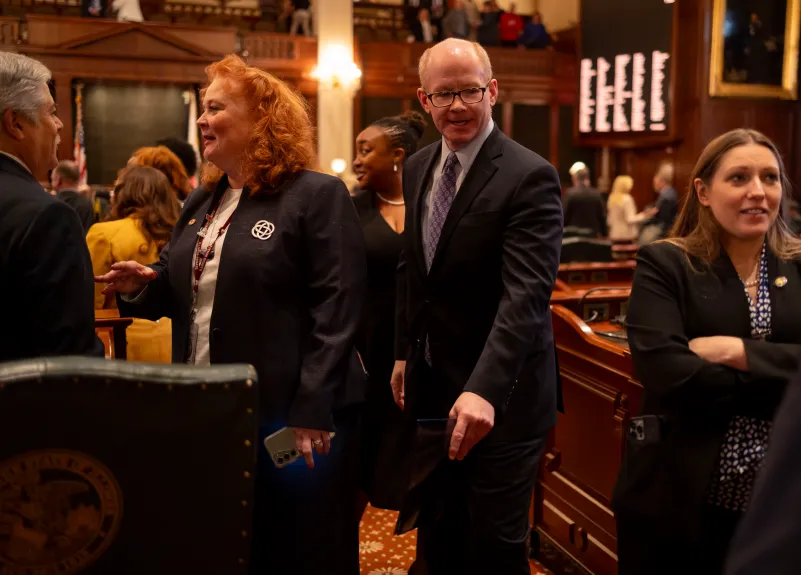Trending
- April 17, 2025
Innovative School Board Reform: Chicago Moves Towards a Hybrid Elected Model

In a landmark decision reflecting the ongoing evolution of educational governance, the Illinois Senate, under Democratic leadership, recently endorsed a transformative approach towards the composition of Chicago’s school board. This bold stride is set to inaugurate a ‘hybrid’ model, blending elected and appointed board members, a strategy poised to reshape educational oversight in Chicago. This initiative not only mirrors the city’s commitment to democratizing school board representation but also addresses long-standing debates surrounding the optimal structure for fostering educational equity and accountability.
The newly proposed model earmarks a significant transition for Chicago, stipulating that residents will directly elect half of the school board members, while the Mayor, currently Brandon Johnson, will appoint the remaining members. This paradigm shift, primarily advocated by Mayor Johnson and the Chicago Teachers Union (CTU), is seen as a balanced compromise, aiming to harmonize diverse interests within the city’s educational ecosystem.
Despite encountering some resistance within the Senate, the proposal successfully passed with a notable majority, underscoring a collective desire to revamp the governance framework of Chicago’s public schools. This development is particularly noteworthy against the backdrop of previous unsuccessful attempts to establish Chicago’s inaugural elected school board. The prevailing consensus reflects a nuanced understanding that while perfection in governance models is elusive, progress necessitates compromise and forward-thinking legislation.
Setting the Stage for Electoral Involvement and Accountability
Central to the approved plan is the phased introduction of an elected board component, scheduled to commence with the upcoming November general elections. This interim ‘hybrid’ arrangement is a precursor to a fully elected board anticipated post the 2026 elections, signifying a gradual but definitive shift towards increased democratic engagement in educational governance.
The Illinois Senate’s endorsement is not merely a procedural milestone but a reflection of a broader dialogue on educational equity and representation. Senate President Don Harmon’s acquiescence to the hybrid model, despite initial reservations, illustrates a pragmatic approach towards legislative compromise, with the ultimate goal of enhancing the school system’s responsiveness to the needs of Chicago’s diverse populace.
Navigating Challenges and Criticisms
While the initiative has garnered support for its innovative approach, it has not been devoid of criticism. Concerns have been raised regarding the model’s ability to adequately represent the voices of all stakeholders, particularly in light of allegations of opaque decision-making processes. Critics, including Northwest Side Alderman Gilbert Villegas, argue that the model, while a step towards democratization, falls short of ensuring a fully democratic process. These critiques underscore the complexity of balancing efficiency, representation, and inclusivity in educational governance.
Towards a More Equitable Educational Future
As Chicago embarks on this groundbreaking journey towards reforming its school board structure, the implications extend beyond the immediate legislative outcomes. This initiative serves as a catalyst for broader discussions on educational equity, governance transparency, and community engagement. By navigating the inherent challenges of implementing a hybrid elected model, Chicago sets a precedent for other cities grappling with similar governance dilemmas.
The commitment to revisiting and refining the model, as evidenced by the inclusion of provisions for future electoral adjustments and ethical guidelines, signifies an ongoing dedication to enhancing the educational landscape. This endeavor, albeit complex, embodies a concerted effort to align Chicago’s educational governance with principles of democratic engagement, accountability, and inclusivity.
As the city progresses towards a fully elected school board, the journey encapsulates the broader aspirations of its residents for a more equitable and representative educational system. This pivotal moment in Chicago’s educational governance not only marks a significant step towards addressing historical disparities but also reaffirms the city’s commitment to fostering an environment where every stakeholder has a voice in shaping the future of education.
© 2023, www.modelilgov.org/. All rights reserved/HOME/privacy-policy/ sitemap